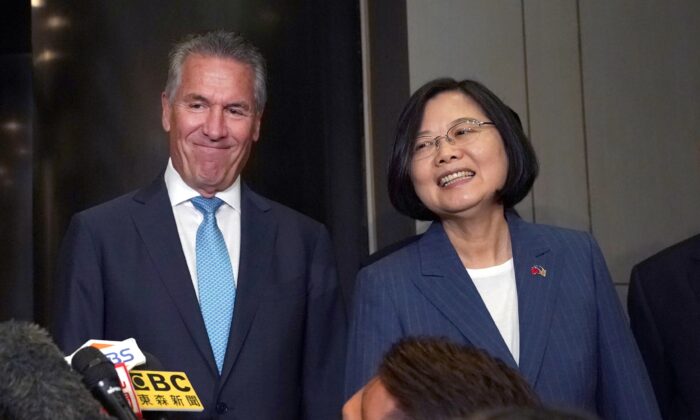WASHINGTON—As the United States moves forward with talks toward a bilateral trade deal with Taiwan, the State Department is expecting backlash from the Chinese regime, while hoping for the best.
The Chinese Communist Party has a long history of retaliating against other country’s decisions that involve what it deems as threats to its power. The regime’s response to a U.S.–Taiwan deal would be “all about Beijing’s decision matrix,” said David Stilwell, assistant secretary of state for East Asia and Pacific affairs.
“But, our job is to obviously think through what those are and anticipate them,” Stilwell said in response to a question by The Epoch Times during a media call on Sept. 2.
“If you look at the language from the three communiques and the Taiwan Relations Act … the economic relationship, cultural exchanges, all those things are fully allowed. There’s nothing that prohibits those things. And so there should be no lash back. The efforts to increase prosperity between the two countries should have no effect.”
Taiwan opened the door on Aug. 28, when President Tsai Ing-wen announced she would move to lift restrictions on imports of U.S. pork and beef.
“This decision is based on our national economic interests and consistent with our overall strategic goals for the future,” Tsai said in a translated statement.
Secretary of State Mike Pompeo welcomed the news.
“This move opens the door for even deeper economic and trade cooperation,” Pompeo wrote on Twitter on Aug. 28.
Keith Krach, the State Department’s under secretary for economic growth, energy, and the environment, is set to begin talks with Taiwan to look for further trade opportunities.
Currently, the United States maintains a robust, nondiplomatic relationship with Taiwan, and supplies the island with military weapons and equipment for its self-defense against Beijing, which has threatened to forcibly annex the self-ruled island.
Health and Human Services Secretary Alex Azar visited Taiwan in early August to sign a cooperative agreement on health.
Beijing postured by flying fighter jets across the unofficial airspace boundary in the Taiwan Strait before Azar’s visit; Chinese foreign ministry spokesperson Wang Wenbin condemned the visit and threatened “firm countermeasures in response to the U.S. wrong move.”
Azar is the highest-level U.S. cabinet official to visit the island since 1979—the year the United States severed official diplomatic ties with the island, in deference to Beijing.
The Trump administration has been vocal about moving supply chains away from China, especially for products involving technology and pharmaceuticals.
In May, Taiwan chipmaking giant Taiwan Semiconductor Manufacturing Co. said it plans to build a US$12 billion factory in Arizona.
Tsai anticipates that the lifting of U.S. beef and pork import restrictions will pave the way to bigger things.
“In the future, we can develop a more dynamic and vigorous economic and trade strategy,” she said. “For industries, especially traditional industries, that have been impacted over the past two years by the U.S.–China trade conflict and the pandemic, this is an important opportunity.”
The Office of the U.S. Trade Representative didn’t immediately respond to a request by The Epoch Times for further details of the trade talks.
Frank Fang and Alan McDonnell contributed to this report.
Focus News: US to Move Ahead With Taiwan Trade Deal, Expects Beijing’s Ire
Report Outlines a Decade of Beijing’s Coercive Diplomatic Tactics
